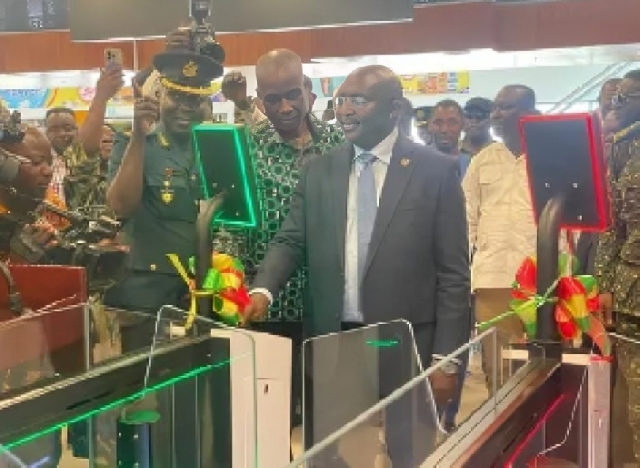Bawumia proposes "smart formalisation" blueprint for Africa at Cambridge
 Dr Bawumia
Dr Bawumia
Former Vice President, Dr. Mahamudu Bawumia, has proposed a modern development blueprint for a resilient and competitive African economy, in the midst of global uncertainties.
Labelled "smart formalisation," Dr. Bawumia told a packed audience at Cambridge University on Saturday at the University's Africa Business Conference that the smart formalisation will enable African governments to build and manage systems, which will also let them ''know their citizens better and interact with them effectively and inexpensively."
Dr. Bawumia noted that after over six decades of independence from colonial rule, most African economies have remained largely informal, with public administration systems facing deep-rooted problems, such as: absence of unique identification for citizens, absence of a functional national property address system; financial exclusion, no individual credit system, over reliance on cash, limited access to healthcare, challenges in revenue mobilisation, among others.
These problems, Dr. Bawumia observed, have resulted in Africa's slow growth over the years, and made it non-competitive in an increasingly changing and competitive world.
"Any society dominated by these characteristics is likely to have low productivity, lower wages, high unemployment, higher cost of living, lower economic growth and higher poverty.
It will not be resilient.
This is the situation that many African countries have been living with for 60 years after independence," Dr. Bawunia said.
Having pointed out the problem, Dr. Bawumia proposed a solution, which he believed would help address the challenges and build a strong foundation for a resilient and progressive African economy, moving forward.
"Let me quickly dive into what I believe presents the greatest opportunity to surmount these challenges and turn them into progress," Dr. Bawumia said.
"The solution will have to be one that accelerates Africa’s development through intra-country, continental and international integration, which facilitates trade and the provision of government services, plus creating a socio-political environment where it is easy and cheap to do business.
In short, it is what I term “smart formalisation.”
“Smart formalisation is a concept where governments build and manage systems which enable them to know their citizens better and can interact with them effectively and inexpensively.
This creates many opportunities both for governments and citizens. Government services can be delivered effectively and cheaply, and citizens can also engage their governments effectively and cheaply and even more safely, because fear of victimisation is minimised through the anonymity that technology can offer.
In this dynamic, synergies are created which lead to a virtuous cycle that speeds development.
" I call it smart formalization because over the decades, especially after WWII, governments have sought to formalize their economies and those in the ‘Global North’ have largely succeeded and as a result have managed to lift many of their citizens out of poverty and provide services to the weak amongst them by mobilizing resources from the wider society at a reasonable cost, " Dr. Bawunia stressed.
" Behind many of these capabilities, which are economically uplifting and have a direct effect in moving their nations forward,d is the application of computer and digital systems.
I say “smart formalisation” because we have to leapfrog what was done in the global North by adopting more current technologies such as blockchain, Artificial Intelligence and Mobile computing.
The former Vice President was confident that smart formalisation "will speed Africa’s economic growth and make our economies more resilient."
"The only way we will survive the risks we are presently confronted with will be to achieve very high economic growth rates (10% or above) consistently for a sustained period.
This is what happened in Asia to lift billions of people out of poverty.
The only way I see this happening in our generation is the widespread adoption of “smart formalisation” through digitalisation of our economies in particular, and societies generally."
"We need to achieve this because the 4th industrial revolution is truly underway, and we cannot get ahead by doing things of old.
Industrialisation is important and indeed imperative, but the emphasis must be more on smart industrialisation and Value-Chain-Collaboration with other nations, all bound together in digital technologies which facilitate seamless processes."
Dr. Bawumia, who has earned international plaudits for championing Ghana's remarkable digitalisation drive when he was Vice President, referenced Ghana's success story in using digitalisation to build a strong foundation for a formal economy.
Ghana now boasts a robust national identity system, digital address system, digitalised public service, as well as instant, interoperable payment systems.
Dr. Bawumia spoke on the theme, "Africa's Digital Transformation: Building Resilient Economies Through Innovation."
The annual Cambridge Africa Business Conference is a flagship programme of the prestigious University, which brings together trailblazers, visionaries and decision makers who are shaping Africa's economic and business landscape.
Source: Classfmonline.com/Cecil Mensah
Trending News

You're commenting without full knowledge of Ghana’s constitutional provisions-A-G to international legal bodies
10:52
Kwahu West fire commander warns of rising accidents on Accra–Nkawkaw–Kumasi road
08:44
Police investigate viral video on threat to President Mahama's life
00:38
Special Anti-Galamsey taskforce seizes four excavators in Bekwai raid
15:24
Collapse of Amanase bridge cripples socio-economic life, chief appeals for urgent gov't support
15:20
Nkawkaw MP donates medical supplies to Kwahu West Health Directorate
08:37
Asiedu Nketia urges prayers and support for President Mahama amid tragedy
08:34
Road crashes surge in 2025: NRSA urges collective action to save lives
20:26
Clergy call for regulation of political prophecies in Ghana
15:11
GCAA ends 3-day corporate strategy review meeting to plan ahead
17:07



